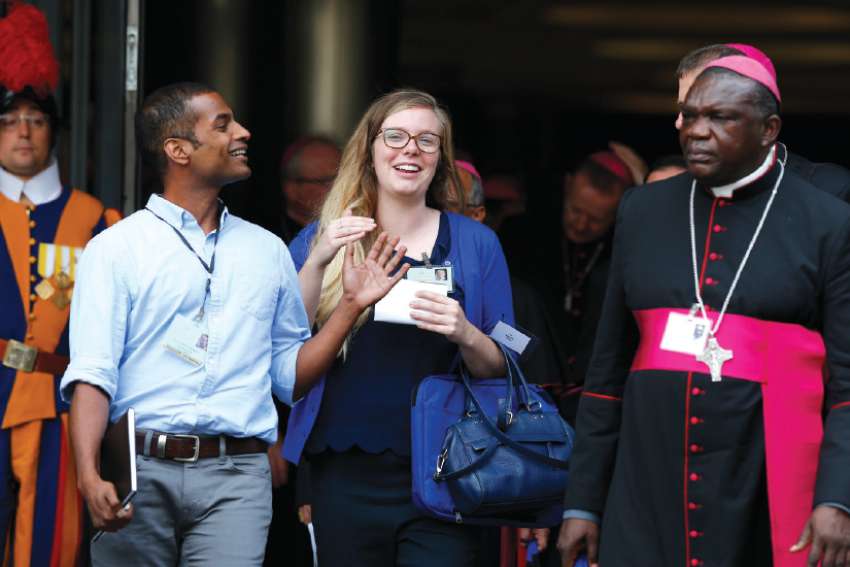Joseph Moeono-Kolio from Samoa, who was representing the Caritas Internationalis Youth Forum and young people from the Pacific Islands, asked the synod on Oct. 11 what young people could do to uproot injustice from the world “when we can’t do it within our own churches.”
The problem of clerical sexual abuse and corruption are present in his region, he said, but “reporting it or even speaking of it here is professional and cultural suicide.”
“Young people are tired of Pharisees, we need fathers,” he said.
Moeono-Kolio used an analogy for how he would like to see young people and elders live and work together. When his ancestors would sail from island to island, he said, strong young people were put in charge of paddling while the elders onboard were in charge of reading the stars in the sky and the ocean currents in order to guide the boat to their common destination.
Whether it is the Pacific Ocean or today’s sea of challenges, he said, “until we start paddling together by way of listening and equipping our young people with the tools to navigate the inevitable storms, our canoe will only float into irrelevance.”
“But if you, our elders, set the right course and steer this canoe in the right direction, we the young faithful are ready to help you power it through the challenges” and bring the light of faith to the ends of the world, he said.
Nicole Anne Perez, who is a catechist in the Philippines, voiced her concerns to the synod about how Catholics in youth ministry can be catalysts of change and find solace, guidance and love in a region with so many huge problems.
The breakdown of families, parents focused more on money than their children, predators taking advantage of children’s poverty for sexual exploitation, inauthentic online relationships and casual sex all leave “ordinary” people wondering what they can do to solve these problems, she said.
Her answer, she explained, is found in Jesus telling the Pharisee that the greatest commandment of all is love — loving God and loving one’s neighbour as oneself.
Chaldean Catholic Safa al Abbia, a 26-year-old dentist from Iraq, urged the synod participants to pray for Iraq and support its Christians and churches.
He said he understands the importance of talking about the more common themes at the synod — the family, sexuality and social media — but the main challenge for young people in Iraq is “peace and stability and their right to live in dignity.”
Young people are struggling to remain faithful as witnesses to Jesus and hold onto their traditions, values and liturgy, he said. But they have grown up seeing many of their brothers and sisters martyred and their churches bombed.
“I will never forget the face of my friends after the Mass when they said, ‘See you next week,’ and I never saw them again because they were burned under the fire of the bombed car” near their church one year.
Al Abbia told Pope Francis that he had a message for him from young people: “They hope one day to see you in Iraq.”
Henriette Camara, a member of the Catholic scouts in Guinea, told the synod that the scout movement “is deeply permeated with Gospel values” and it helps young people deepen their faith and love for Christ and the Church.
Catholic scouts can help those young people who have given up on life or are headed down errant paths, she said, because “we are young optimists who face life’s daily problems with stamina, courage and wisdom.”


